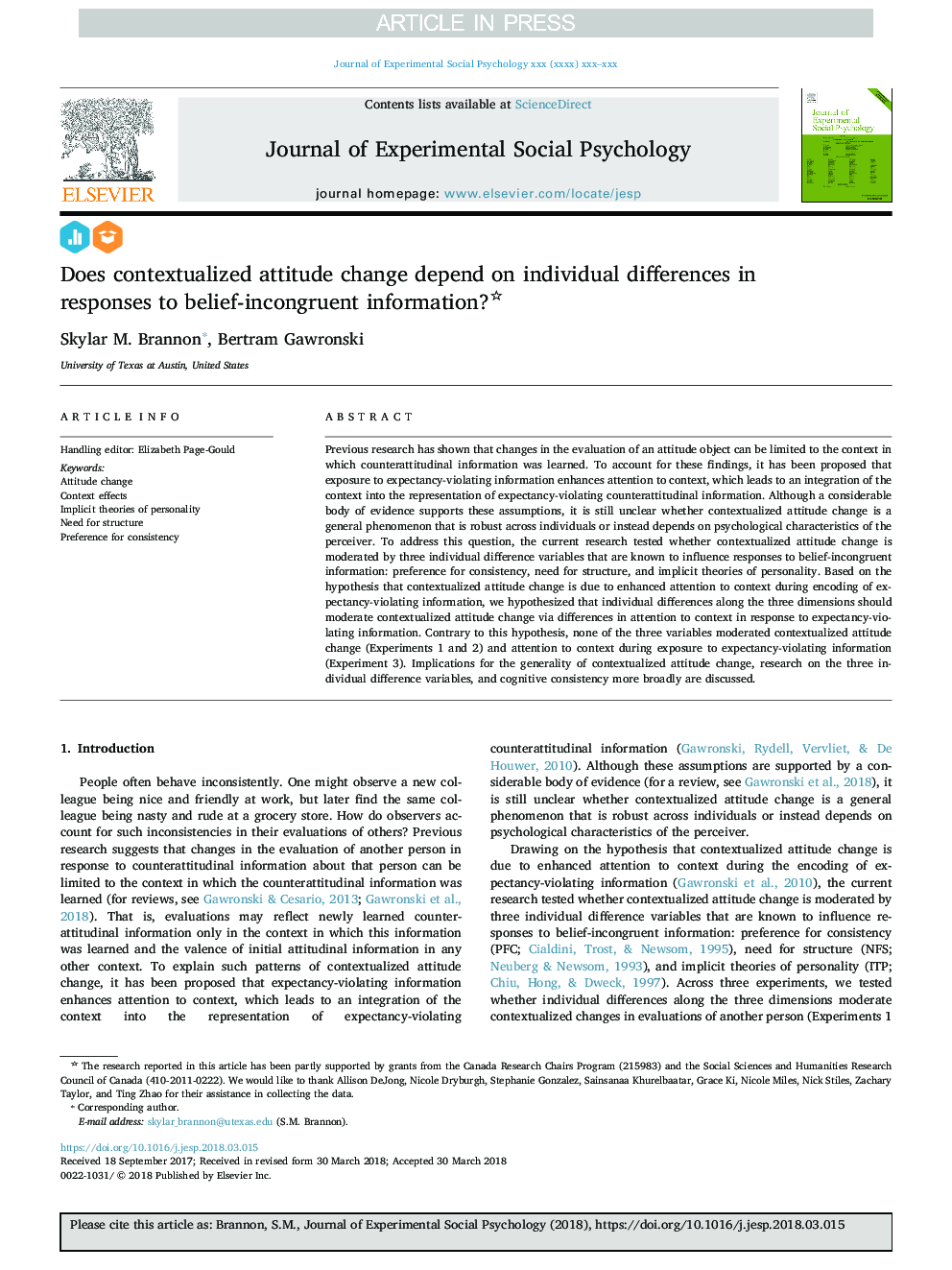| کد مقاله | کد نشریه | سال انتشار | مقاله انگلیسی | نسخه تمام متن |
|---|---|---|---|---|
| 7323985 | 1475845 | 2018 | 14 صفحه PDF | دانلود رایگان |
عنوان انگلیسی مقاله ISI
Does contextualized attitude change depend on individual differences in responses to belief-incongruent information?
ترجمه فارسی عنوان
آیا تغییر نگرش متافیزیکی بستگی به تفاوت های فردی در پاسخ به اطلاعات باور نکردنی دارد؟
دانلود مقاله + سفارش ترجمه
دانلود مقاله ISI انگلیسی
رایگان برای ایرانیان
کلمات کلیدی
تغییر نگرش، اثرات زمینه، تئوری های نامتعارف شخصیت، نیاز به ساختار، ترجیح برای ثبات،
ترجمه چکیده
تحقیقات قبلی نشان داده است که تغییرات در ارزیابی یک شیء نگرشی می تواند محدود به زمینه ای باشد که در آن اطلاعات ضد تراکنش آموخته شده است. برای این یافته ها، پیش بینی شده است که قرار گرفتن در معرض اطلاعات نقض کننده انتظارات، توجه به زمینه را افزایش می دهد، که منجر به یکپارچگی زمینه در نمایش اطلاعات ناقص امیدبخش می شود. اگر چه شواهد قابل توجهی از این فرضیه ها را پشتیبانی می کند، هنوز مشخص نیست که آیا تغییر نگرش متنی یک پدیده کلی است که در میان افراد قوی باشد یا نه، بستگی به ویژگی های روان شناختی درک کننده دارد. برای پاسخ دادن به این سوال، تحقیقات کنونی بررسی شده است که آیا تغییر نگرش متناظر با سه متغیر اختلاف فردی که شناخته شده است بر پاسخ به اطلاعات غلط باور نکردنی تأثیر می گذارد: ترجیح انسجام، نیاز به ساختار و نظریه های ضمنی شخصیت. بر اساس این فرضیه که تغییر نگرش متافیزیکی به دلیل افزایش توجه به متن در طی رمزگذاری اطلاعات ناقص امیدبخش، ما فرض کردیم که تفاوتهای فردی در سه بعد باید تغییر را از طریق تفاوت در توجه به متن در پاسخ به اطلاعات نقض کننده انتظارات . بر خلاف این فرضیه، هیچ یک از سه متغیر، تغییرات نگرش متنی (تجربیات 1 و 2) و توجه به متن را در هنگام قرار گرفتن در معرض اطلاعات مبهمی انتظار (روند آزمایشی 3) را تغییر داد. به طور گسترده ای به بحث در مورد تأثیرات کلی تغییر نگرش متافیزیکی، تحقیق بر روی سه متغیر اختلاف فردی و سازگاری شناختی پرداخته می شود.
موضوعات مرتبط
علوم زیستی و بیوفناوری
علم عصب شناسی
علوم اعصاب رفتاری
چکیده انگلیسی
Previous research has shown that changes in the evaluation of an attitude object can be limited to the context in which counterattitudinal information was learned. To account for these findings, it has been proposed that exposure to expectancy-violating information enhances attention to context, which leads to an integration of the context into the representation of expectancy-violating counterattitudinal information. Although a considerable body of evidence supports these assumptions, it is still unclear whether contextualized attitude change is a general phenomenon that is robust across individuals or instead depends on psychological characteristics of the perceiver. To address this question, the current research tested whether contextualized attitude change is moderated by three individual difference variables that are known to influence responses to belief-incongruent information: preference for consistency, need for structure, and implicit theories of personality. Based on the hypothesis that contextualized attitude change is due to enhanced attention to context during encoding of expectancy-violating information, we hypothesized that individual differences along the three dimensions should moderate contextualized attitude change via differences in attention to context in response to expectancy-violating information. Contrary to this hypothesis, none of the three variables moderated contextualized attitude change (Experiments 1 and 2) and attention to context during exposure to expectancy-violating information (Experiment 3). Implications for the generality of contextualized attitude change, research on the three individual difference variables, and cognitive consistency more broadly are discussed.
ناشر
Database: Elsevier - ScienceDirect (ساینس دایرکت)
Journal: Journal of Experimental Social Psychology - Volume 78, September 2018, Pages 148-161
Journal: Journal of Experimental Social Psychology - Volume 78, September 2018, Pages 148-161
نویسندگان
Skylar M. Brannon, Bertram Gawronski,
